Posts By


Loyalty to Country, Not to a Man

Too much of our politics today has twisted the idea of loyalty. We’re told to prove we’re “true patriots” by lining up behind one politician, one party, one personality. That’s not patriotism—that’s blind allegiance.
Real loyalty isn’t to a man. Real loyalty is to our country. And a country shows its loyalty back by taking care of its people. That means intelligent solutions, not slogans. It means tackling the hard problems—healthcare, jobs, inflation, veterans’ care—with real ideas instead of scapegoats.
If a leader asks for loyalty to themselves instead of loyalty to the people, that’s a red flag. We don’t need cults of personality. We need leaders willing to work, compromise, and solve problems.
Stop the bullshit. Enough with the distractions. Loyalty to country means loyalty to each other—and it’s time our politics caught up to that simple truth.
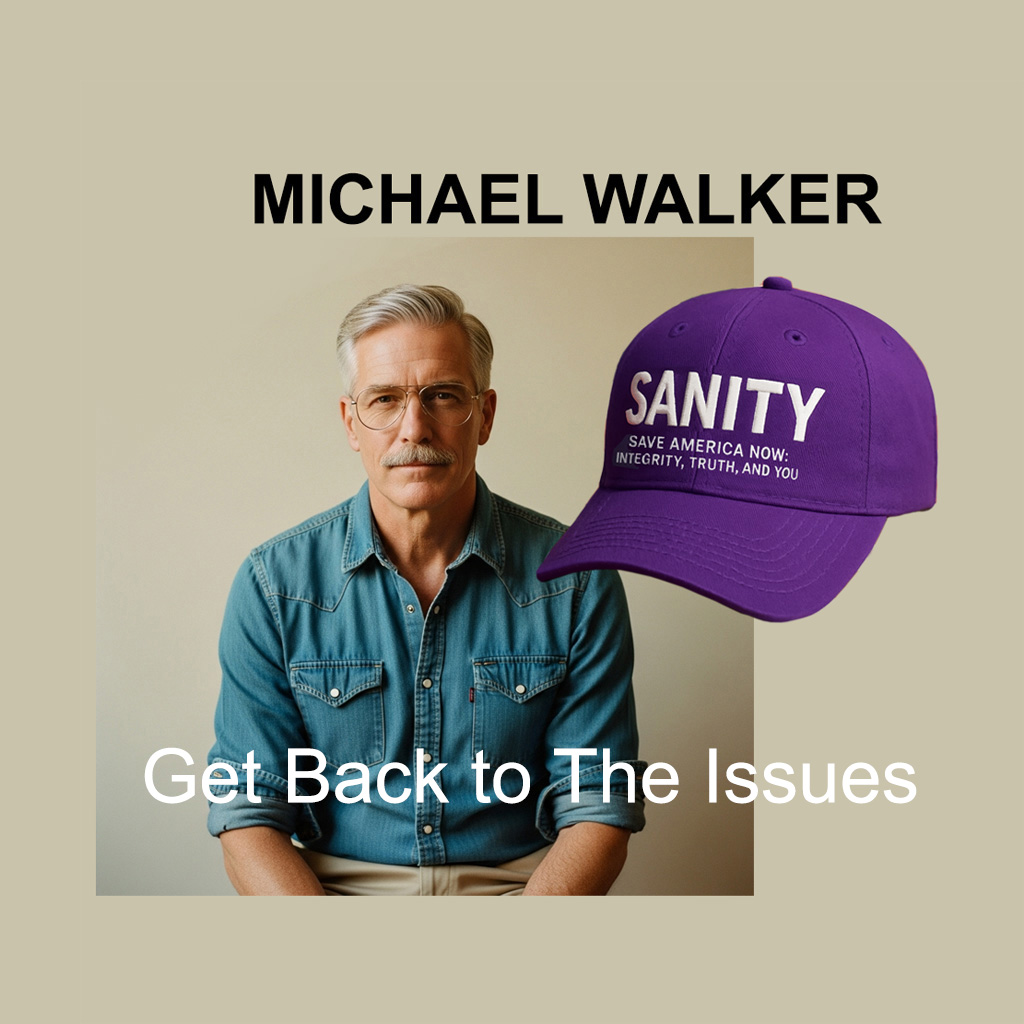
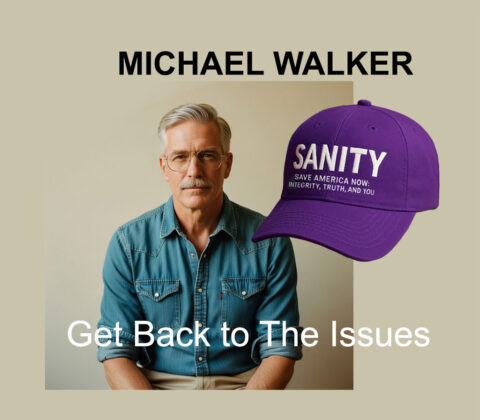
Get Back to the Issues
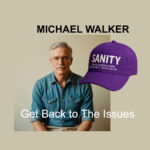
Election season is here, and with it comes a flood of ads and fundraising emails. Most of them have a familiar rhythm: tell us the country is on the brink, paint the other side as evil, and finish with “chip in now if you’re a true patriot.”
What’s missing? The issues that actually affect us.
Where are the promises to make healthcare more affordable? To create better jobs and protect small businesses? To tackle inflation in a way that makes sense to working families? To make sure veterans have the care and respect they’ve earned?
Voters deserve more than fear and name-calling. It doesn’t matter if the attack ads come from the right or the left—they’re distractions. What matters is whether a candidate will look us in the eye and tell us what they plan to do for our families, our communities, and our future.
Ignore the hype. Don’t let the noise drown out the questions that matter most. We have the power to demand real answers about healthcare, jobs, inflation, and veterans’ care. If someone wants our vote, that’s what they should be talking about.

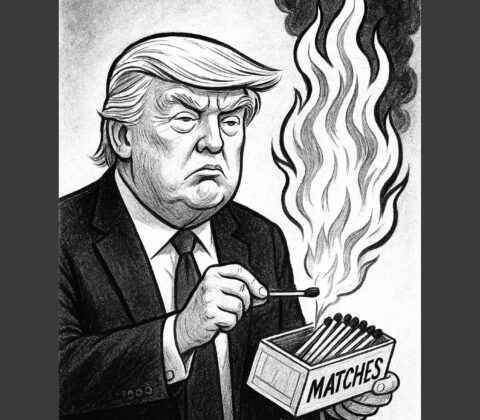
8/30/2025 What has Trump done in the past 14 days in a nutshell.
Here are the key actions taken by President Donald Trump in the past two weeks (August 1–15, 2025)
Here’s what President Trump has been up to over the past two weeks:
Key Highlights: What Trump Has Done Recently
1. Tariffs Face Legal Blow
A federal appeals court ruled in a 7–4 decision that Trump’s use of emergency powers to impose broad “reciprocal” tariffs exceeded his authority—but, for now, the tariffs remain in effect as the administration appeals to the Supreme Court. Tariffs on steel, aluminum, and automobiles remain unaffected for the moment.
2. Crime Crackdown & Militarized Policing
Trump has authorized aggressive federal intervention in crime-fighting efforts, including deploying National Guard troops to Washington, D.C., and planning deployments to Chicago. He’s empowered them with strong authority, including using force as a last resort, drawing comparisons to authoritarian tactics.
3. Lisa Cook Fires Back
Fed Governor Lisa Cook has vowed to sue, arguing that Trump’s attempt to fire her on unfounded mortgage fraud allegations is illegal and undermines the Federal Reserve’s independence.
4. White House Contractor Banned Over Rose Garden Damage
After discovering a “deep and nasty” 25-yard crack in the newly renovated Rose Garden patio, Trump publicly named and banned the contractor responsible. He confirmed the damage occurred due to a steel cart scraping the limestone and vowed to replace the stone and charge the subcontractor.
5. Critics Decry Lack of Cabinet Diversity
The Guardian spotlighted mounting criticism of Trump’s cabinet composition—revealing that only one Black individual serves among 24 senior officials. The firing of Federal Reserve Governor Lisa Cook and others is being seen by critics as a deliberate rollback of racial representation and equity in government.
6. Diplomatic Snub from India’s PM
Reports reveal that Prime Minister Modi declined Trump’s recent invitations to travel to Washington, signaling a diplomatic distancing and frustration over Trump’s media-driven approach and “photo-op” focus.
At a Glance
| Theme | What’s Happening |
|---|---|
| Trade authority challenged | Court rules Trump’s tariff imposition was unauthorized—appeal pending |
| Crime and law enforcement | National Guard deployments and heightened federal policing raise civil liberties concerns |
| Federal Reserve conflict | Fired Fed Governor is fighting back in court, citing improper presidential overreach |
| White House drama | Trump publicly confronts contractor over Rose Garden damages—contract revoked |
| Diversity concerns | Cabinet criticized as overwhelmingly white amid firings of prominent Black figures |
| Strained diplomacy | India’s PM reportedly snubs Trump—diplomacy may be slipping into optics-driven tension |
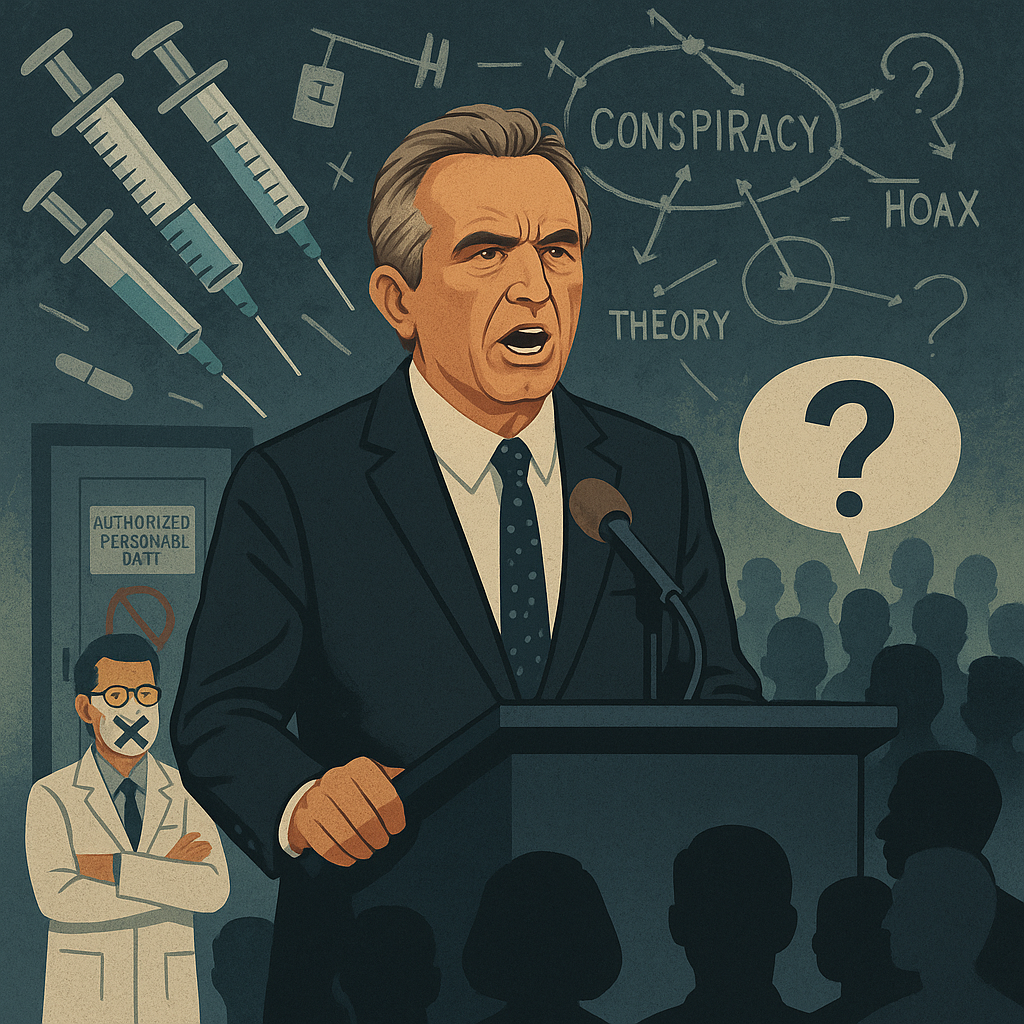
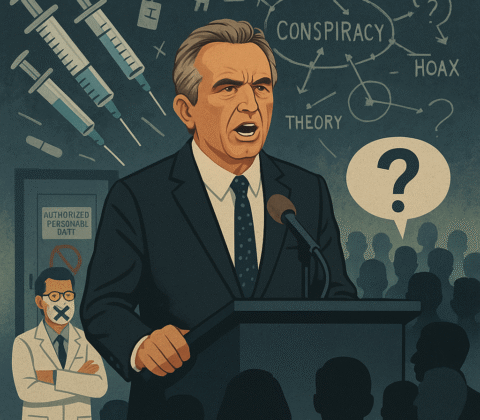
8/30/2025 Changes or Headlines for National Healthcare in the past two weeks
Here’s a comprehensive roundup of national healthcare news from the past two weeks:
Key Headlines & Policy Updates
1. States Move Toward Public Health Autonomy
Connecticut and several New England states are coordinating regional public health strategies in response to federal policy shifts—including proposed halts to COVID-19 vaccine distribution and removal of $500 million in mRNA vaccine funding. Governors and health officials want to maintain evidence-based vaccine guidance independently from federal changes.CT Insider
2. Leadership Turmoil at the CDC
President Trump fired CDC Director Susan Monarez, appointing Jim O’Neill as acting director—a decision supported by Health Secretary RFK Jr. This upheaval prompted the departure of several senior scientists and drew bipartisan concern about the politicization of the agency and potential threats to scientific integrity.AP NewsThe Guardian
3. Court Overturns CMS Broker Compensation Cap
A federal judge struck down a 2024 CMS rule that had limited Medicare Advantage brokers’ compensation to $100. Without the cap, brokers can now receive market-based commissions, raising concerns about increasing marketing-focused incentives over patient-centric care. CMS has until mid-October to appeal.MarketWatch
Broader Context & Legislative Movement
-
The “One Big Beautiful Bill Act”, passed earlier, continues to spark debates due to deep cuts in Medicaid and SNAP, as well as work requirements for Medicaid recipients. Critics warn of millions losing coverage.The Washington PostThe GuardianInvestopediaWikipedia
-
In Congress, bipartisan proposals such as the Protecting Healthcare and Lowering Costs Act aim to reverse these Medicaid and ACA subsidy cuts while extending premium tax credits permanently.Alston & BirdWorldatWork
-
Other legislative efforts include:
-
The Hospital Inpatient Services Modernization Act, proposing a five-year extension for “Hospital at Home” programs to promote in-home acute care.WikipediaNational Law Review
-
States like Iowa, Louisiana, and North Carolina are implementing or adapting Medicaid reforms—ranging from work requirements and doula coverage to budget extensions and transportation services.Health Management Associates+2Health Management Associates+2
-
-
A surge in urban hospitals gaining rural Medicare designations raises concerns about eligibility for rural-focused funding under H.R. 1.Alston & BirdHealth Management Associates
-
HHS has launched MAHA in Action, an interactive platform highlighting implementation of its “Make America Healthy Again” agenda—covering reforms in food, health labeling, and vaccine advisory restructuring. It also includes real-time maps of ongoing initiatives.Alston & Bird
-
The HHS Office of Inspector General reports a notable rise in Medicare enrollees leaving hospitals against medical advice (AMA), especially correlated with lower-rated hospitals and vulnerable populations.Alston & Bird
-
A recent Supreme Court decision allows NIH to pause $783 million in grants tied to DEI and gender-related research, pending a jurisdictional review—highlighting a broader clash over funding criteria.Alston & Bird
Quick Summary Table
| What’s Changing | Key Highlights |
|---|---|
| CDC Leadership Crisis | Firing of director, mass resignations, concern over political interference |
| State-led Public Health Push | New England states coordinating independent vaccine and health response |
| Broker Pay in Medicare Advantage | Court lifts broker pay cap; potential shift toward profit-driven marketing |
| Legislative Pushback | Bipartisan bills aim to reverse Medicaid/ACA cuts from OBBBA |
| Home-Based Care Extensions | “Hospital at Home” expansion bill under consideration |
| Medicaid Reforms at State Level | Iowa work requirements; Louisiana doula coverage; NC financial delays |
| Rural Funding Eligibility | Urban hospitals leveraging dual designation to tap rural support |
| MAHA & Oversight Tools | Real-time tracker for HHS reforms; reports on AMA trends and Medicaid eligibility |
| NIH Grant Suspension | Supreme Court allows temporary halt of DEI/gender research funding |

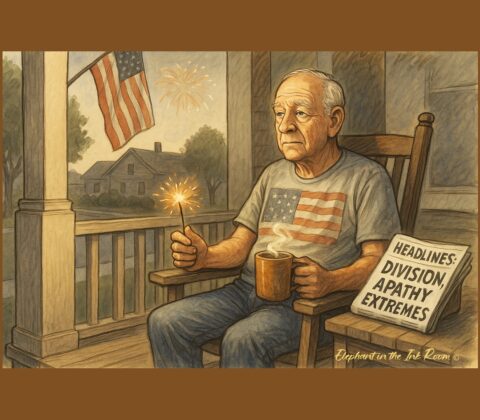
8/30/2025 Veterans’ benefits and healthcare from the past two weeks:
Here are the key updates on veterans’ benefits and healthcare from the past two weeks:

Here’s a roundup of key veterans-related news from the past 14 days:
Top Headlines
-
Proposed VA Abortion Ban Under Trump Administration
The administration has proposed a new rule prohibiting abortions at VA facilities, even in cases of rape or incest. The only exception would be when a pregnancy is life-threatening. Critics argue the rule could endanger vulnerable veterans and restrict necessary care, reversing expansions made in 2022. -
Military REBOOT Launching Women-Only Trauma Recovery Course
Starting September 15 in Big Rapids, Michigan, a 12-week, faith-based trauma recovery course for women veterans, active-duty personnel, first responders, and their families will begin. It’s peer-led and has shown success in reducing issues like divorce, substance abuse, and suicide among military families. -
Baldwin VFW Celebrates 50 Years of Service
The Baldwin VFW Peacock Post 5315 marked its 50th year of supporting veterans and the local community. Established in 1975, it continues to serve veterans of various eras through services such as honor guards, educational initiatives, and outreach to nursing homes. -
Critic: Veterans Prefer Benefits Over More Medals
Veteran Matt Scherer criticized Rep. Tony Gonzales’ proposal for a new Iranian Campaign Medal, arguing veterans would rather see improvements in tangible benefits. He emphasized delays in receiving DD Form 214—a critical document for accessing benefits—pose significant obstacles for veterans.
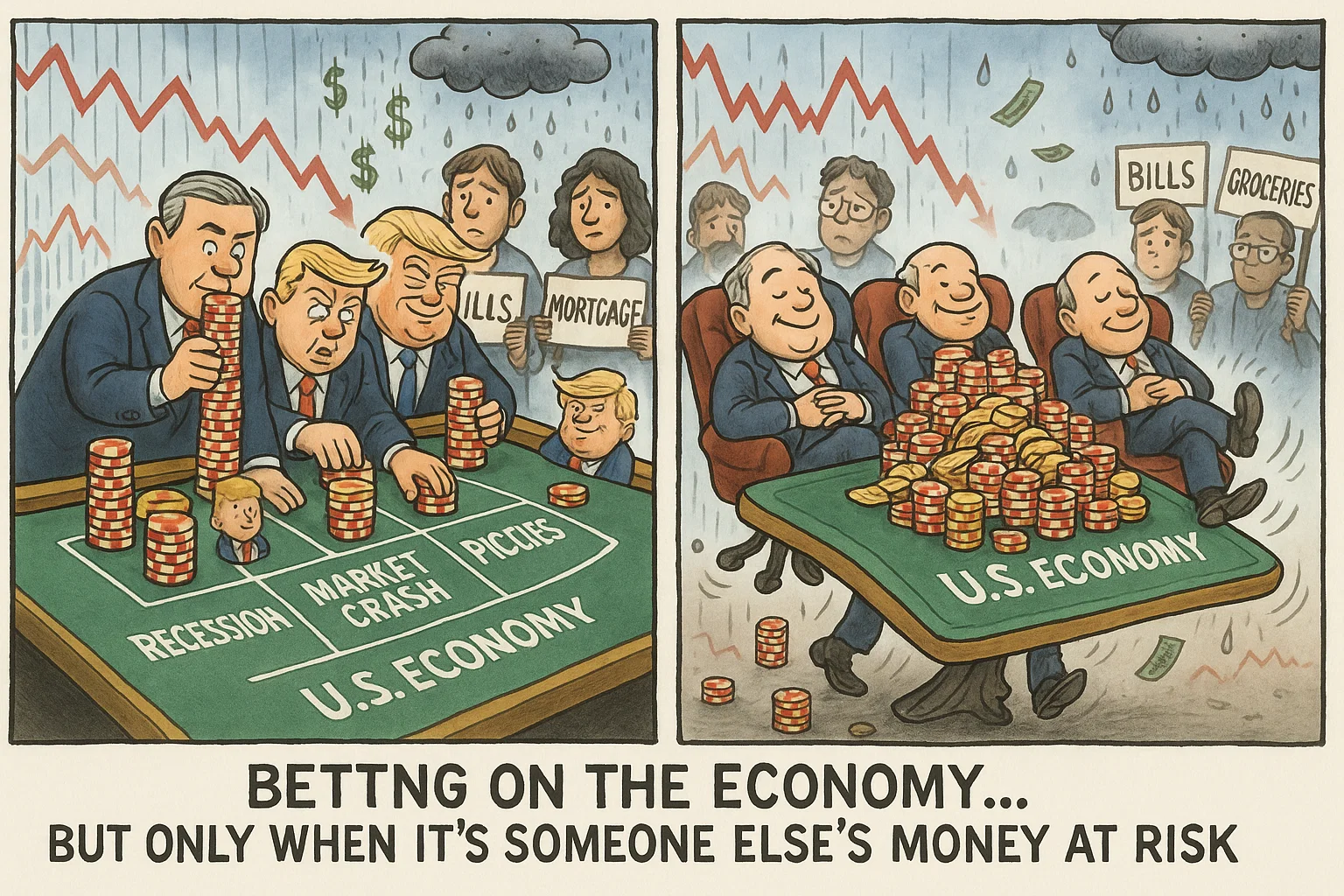
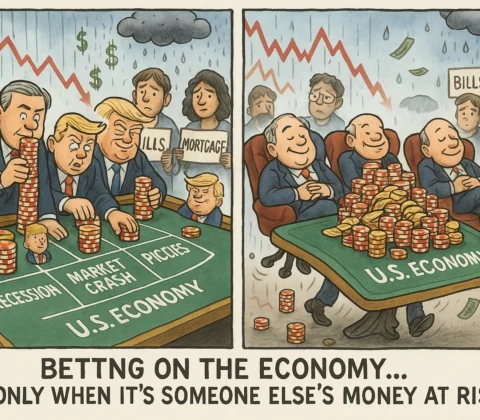
Betting Against The Economy, why would Trump do that?

It’s one thing for ordinary investors to bet against the economy—it’s another when those in power do it. Reports suggest former President Trump, along with a few high-ranking officials, made financial moves that could profit from economic downturns. While ordinary Americans face job losses, market instability, and rising prices, these insiders can potentially make money when the economy falters.
This isn’t new. During the early days of COVID-19, several U.S. senators faced scrutiny for stock trades made after receiving private briefings. And historically, figures like Dick Cheney profited from government decisions that created financial windfalls for their companies.
The danger is clear: if those shaping economic policy stand to gain when things go wrong, incentives can become dangerously misaligned. Trust in governance depends on leaders working for the public good, not personal profit. Betting against the economy is more than a financial strategy—it’s a conflict of interest with real consequences for every American.
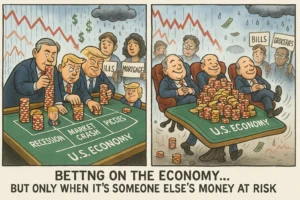
When leaders or high-ranking officials make financial moves that profit from economic decline, it undermines the very foundation of public trust. Reports suggest former President Trump and some government officials may have engaged in activities that allow them to benefit if the economy falters. These actions are troubling because while ordinary Americans face layoffs, inflation, and market volatility, insiders with privileged information can stand to gain.
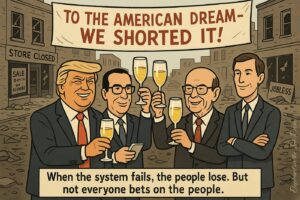
This isn’t a new phenomenon. In 2020, during the early days of the COVID-19 pandemic, several U.S. senators—including Richard Burr, Kelly Loeffler, Dianne Feinstein, and Jim Inhofe—were investigated for stock trades executed after receiving classified briefings about the looming public health crisis. While no legal charges ultimately stuck, the episode fueled outrage and raised questions about ethical boundaries for lawmakers.
Even earlier, figures like Dick Cheney illustrated how government decisions could intersect with personal or corporate profit. Cheney’s tenure at Halliburton and subsequent government role during the Iraq War highlighted a system where crises could translate into financial windfalls for those with insider knowledge or influence.
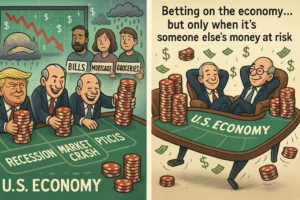
The broader problem is structural: if policymakers benefit when the economy or public welfare suffers, their incentives can conflict with the public good. Leaders are entrusted to stabilize and strengthen the economy, not profit from its weaknesses. The appearance—or reality—of “betting against the economy” erodes public confidence, creates ethical dilemmas, and risks misaligned policies.
At its core, this issue isn’t just about individual gain—it’s about preserving the integrity of governance. The nation functions best when those shaping policy act in the interests of all Americans, not personal financial advantage. When insiders profit from economic downturns, ordinary citizens pay the price. Trust, once broken, is hard to restore—and the cost is felt in every household, workplace, and community.
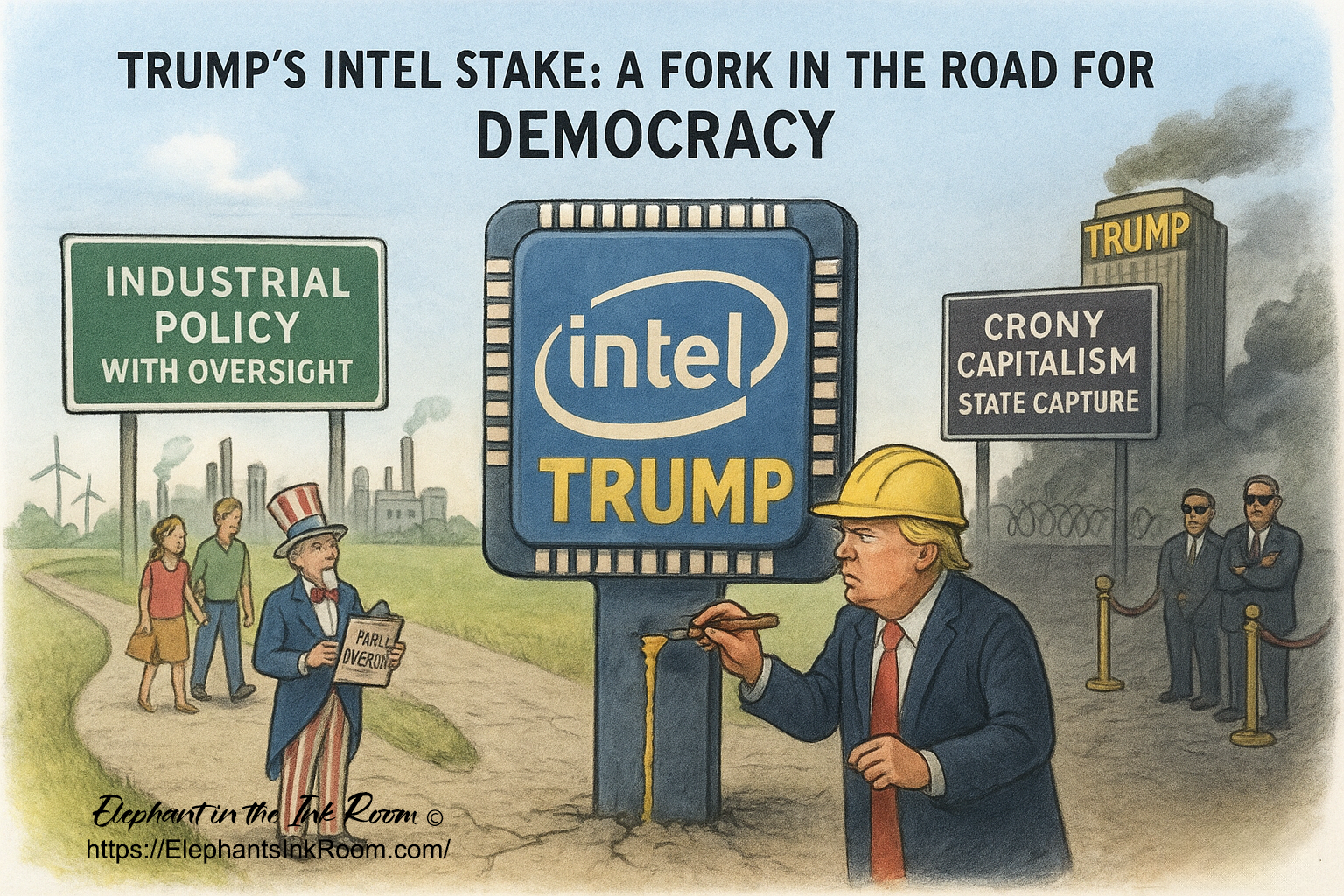
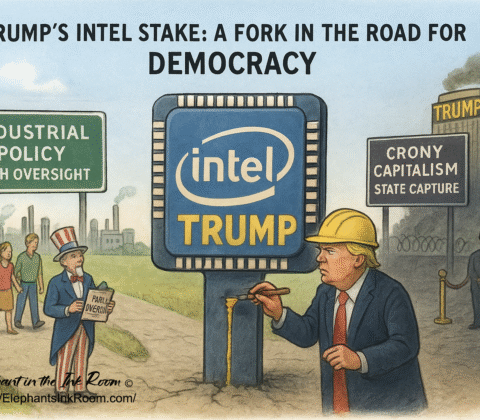
10% government stake in Intel – Good or Bad
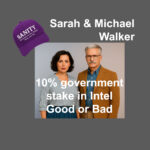
1. What Trump Did
-
The administration reportedly secured a 10% government stake in Intel, and has intervened directly in markets.
-
This marks a shift from the Reagan-era conservative doctrine of deregulation, privatization, and “government out of the way.”
-
Instead, it leans toward industrial policy—the government actively picking winners and reshaping industries.
2. How It Changes Things
Potential Benefits
-
Strategic control: In critical sectors like semiconductors, government ownership could ensure national security and reduce reliance on foreign supply chains (esp. China).
-
Public leverage: A stake means taxpayers share in profits, not just subsidies. If Intel succeeds, the public could benefit directly.
-
Rapid mobilization: In crises (like war or supply chain breakdown), the government can direct resources more efficiently.
Potential Risks
-
Erosion of free-market discipline: When government owns part of a company, it can distort competition and reward political allies rather than the best performers.
-
Politicization of business: Decisions might be driven by electoral or partisan considerations, not long-term stability.
-
Crony capitalism: The line between legitimate national security intervention and favoritism for friends/donors becomes blurry.
3. Implications for Democracy
This is where it gets tricky:
-
Better for democracy (if done transparently):
-
If citizens see that government stakes mean accountability, profit-sharing, and national resilience, it could rebuild trust that democracy delivers.
-
Industrial policy, done openly, shows government is actively trying to protect workers, jobs, and sovereignty.
-
-
Worse for democracy (if done opaquely):
-
If Trump (or any leader) can direct state capital toward allies, donors, or politically useful industries, it becomes a tool of authoritarian-style control.
-
Concentrated power in the executive branch—deciding which companies thrive—weakens the role of Congress, markets, and watchdog institutions.
-
Citizens could lose faith that the economy is fair, seeing it instead as rigged by political power.
-
4. Historical Context
-
Reagan: Deregulation + belief in private sector efficiency.
-
FDR / WWII: Heavy government involvement in production—seen as necessary in an existential crisis.
-
China today: State-capitalist model—government directs investment, controls key industries, uses companies for geopolitical leverage.
Trump’s move edges the U.S. slightly toward the China model, away from the Reagan model.
5. The Democratic Bottom Line
-
If transparent and accountable → could strengthen democracy by showing government works for the people.
-
If secretive and politicized → could weaken democracy by concentrating power and blurring public/private interests.
So the real test isn’t just the Intel stake itself—it’s whether it’s managed with checks, balances, and public oversight, or whether it becomes another lever of personal power.
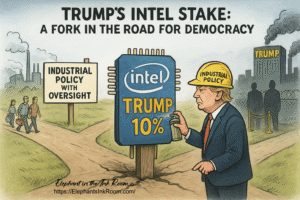
Trump’s Economic Shift: What It Means for Democracy
The Change
Trump is moving away from Reagan-era free-market conservatism by having the government take direct stakes in companies (Intel being the headline example) and intervening in markets.
Potentially Strengthens Democracy (Pro Case)
-
Shared Prosperity – If taxpayers hold equity, the public—not just private investors—benefits from profits.
-
National Security – Strategic industries (like semiconductors) stay resilient and less dependent on adversarial nations (esp. China).
-
Visible Action – Citizens see government actively solving problems, restoring some trust that democracy “delivers.”
-
Crisis Readiness – In moments of emergency, government stakes allow faster mobilization than free markets alone.
Analogy: FDR’s New Deal and WWII mobilization — heavy government involvement, but ultimately seen as strengthening democracy by protecting people and the nation.
Potentially Weakens Democracy (Con Case)
-
Politicized Economy – Leaders may favor allies, donors, or swing-state industries, eroding faith in fairness.
-
Crony Capitalism – Public stakes become a cover for funneling wealth or contracts to insiders.
-
Erosion of Checks & Balances – The executive, not Congress or independent regulators, ends up controlling major sectors of the economy.
-
Authoritarian Drift – Citizens may see government as a tool of one leader’s power rather than an impartial institution.
Analogy: China’s state-capitalist model — stability and strength for a time, but at the cost of transparency and individual freedom.
The Democratic Bottom Line
-
If transparent and accountable → this could look like a 21st-century New Deal: democracy showing it can adapt, protect, and deliver for its people.
-
If opaque and self-serving → this could be one more step toward government by strongman, where the economy is bent to political loyalty instead of public good
-
Here’s what public sources indicate regarding whether Donald Trump or his family personally hold any financial interest in Intel:
No Personal Financial Stake Reported
All credible reporting confirms that the 10% stake in Intel is held by the U.S. government, not any individual, including Trump or his family.
-
Financed through grants: The government converted roughly $11 billion from previously allocated CHIPS and Secure Enclave grants into a non-voting equity stake—approximately 9.9% to 10% of Intel.
-
Passive investment: The government’s ownership is described as passive—no board seats, no governance or information rights, and agreement to vote with Intel’s board in most cases.
-
Not Trump-family property: None of the reports mention any personal ownership by Trump or his family. The capital involved came strictly from federal funds, not private assets.
Financial Disclosure Context
-
Trump’s known investment profile: Public records and reporting show he has diversified holdings across multiple sectors (stocks, real estate, funds, etc.), including historical past holdings in companies like Intel. Yet, there is no indication that he or his family currently hold private Intel stock or a stake in this government-led deal.
-
The recent Intel stake is clearly portrayed as a federal government transaction, with no intermingling of Trump’s personal finances.
Summary Table
Entity Reports Indicate Stake? Notes Donald Trump (personal) No No evidence of ownership tied to this Intel stake Trump Family No No public disclosures connecting family to Intel equity U.S. Government (Trump administration) Yes 10% non-voting stake acquired from federal grants
Bottom Line
-
There is no public information or credible report showing that Trump or his family has any personal financial interest or greed in Intel related to this deal.
-
The 10% stake is strictly a federal government investment, backed by grants—not private funds.
.
-





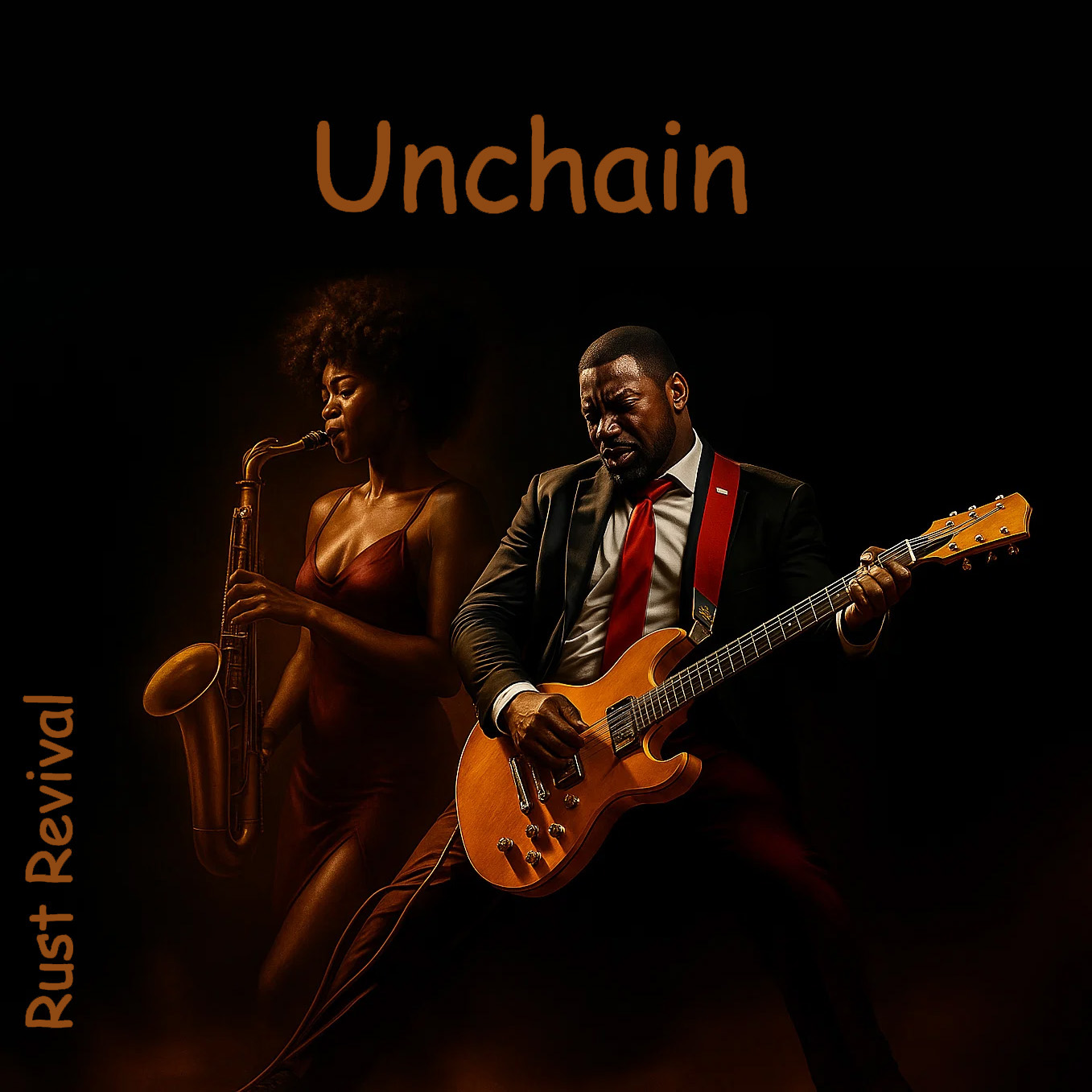







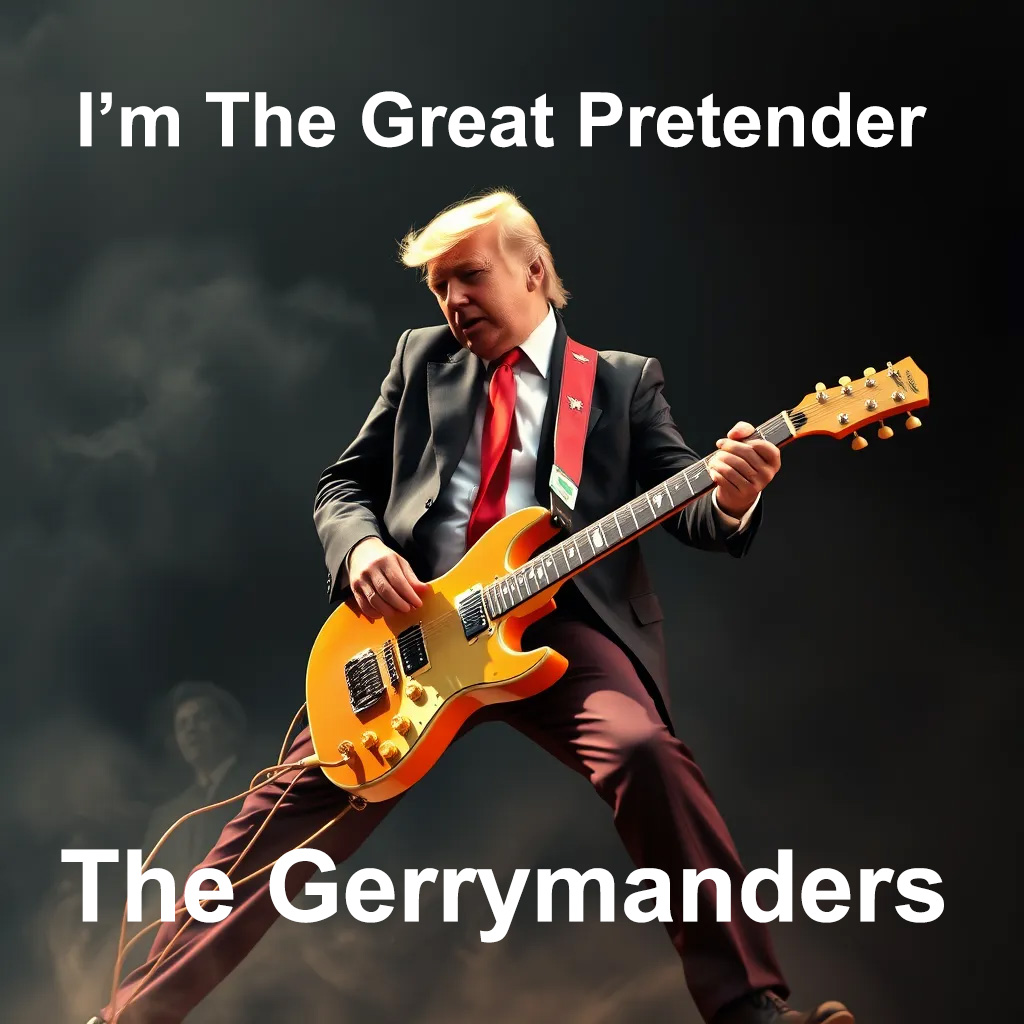
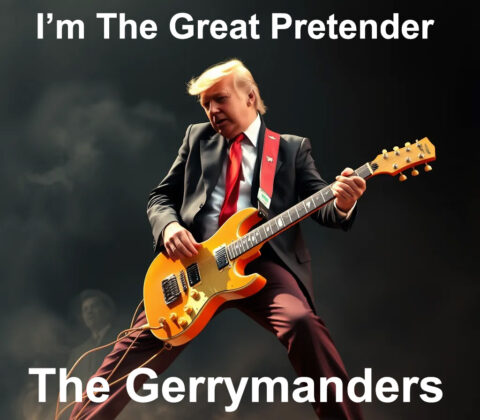

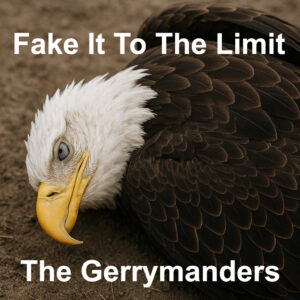

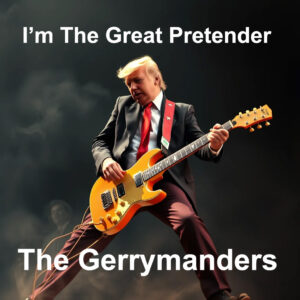




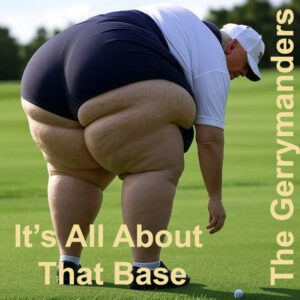




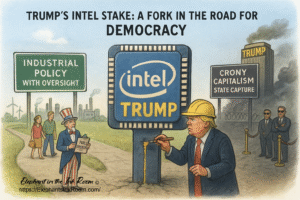
Warranty Not Included
Warranty Not Included
Imagine if politicians had to back their campaign promises the way companies back a product. If the car doesn’t run, you get a refund. If the fridge dies, you get a replacement. But in politics? Once the votes are counted, the warranty disappears.
The reality is that campaign promises aren’t legally binding — they’re more like advertising slogans. Courts protect them as free speech, not contracts. That’s why we hear sweeping pledges about fixing healthcare, cutting taxes, or “draining the swamp,” but see little accountability when those promises vanish.
We’ll never pass a law requiring politicians to deliver on every word. But we can demand accountability in other ways: watchdog groups tracking promises, media holding leaders to their own words, and voters refusing to reward empty hype.
Because in the end, democracy shouldn’t come with fine print. If you make a promise to the people, the least you can do is try to keep it.
Share this:
Like this: